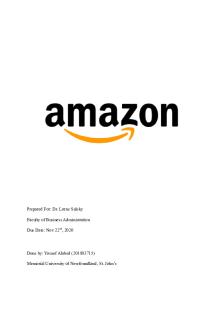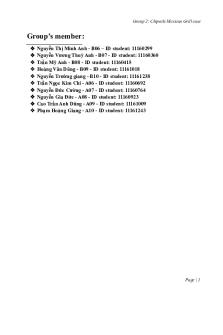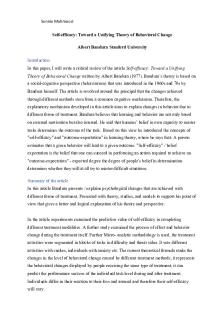FIN657 Article Review Individual Assignment PDF

| Title | FIN657 Article Review Individual Assignment |
|---|---|
| Author | Nur Auni Zayanah |
| Course | Business ethics |
| Institution | Universiti Teknologi MARA |
| Pages | 6 |
| File Size | 112.9 KB |
| File Type | |
| Total Downloads | 31 |
| Total Views | 144 |
Summary
NUR AUNI ZAYANAH BINTI MOHD ZAMRITBA2425A2018440854FINSIR MOHD HUSNIN BIN MAT YUSOF5 companies that goes into bankrupt due to their unethical and poor corporate governance practices. Your individual task will be to list the companies together with its modus operandi which able to attract the investo...
Description
NUR AUNI ZAYANAH BINTI MOHD ZAMRI TBA2425A 2018440854 FIN657 SIR MOHD HUSNIN BIN MAT YUSOF
5 companies that goes into bankrupt due to their unethical and poor corporate governance practices. Your individual task will be to list the companies together with its modus operandi which able to attract the investors.
1. THERANOS – ELIZABETH HOLMES Elizabeth Holmes who is 19 years old in 2003 was founded a blood testing company which name Theranos, a company that blends the words "theraphy" and "diagnosis”. Her plan is to transform healthcare by making blood-testing techniques more affordable and accessible. The next year, she drops out of Stanford and starts constructing the company with the premise that it might detect health concerns with just a few drops of blood from a finger prick. Holmes was able to attract high-profile investors from the start, including Henry Kissinger, Betsy DeVos, and Rupert Murdoch. In 2010, Theranos claims to have raised $45 million through the sale of equity, options, warrants, and other security interests in a filing with the US Securities and Exchange Commission. Theranos is currently valued at $1 billion. Started 2013, Theranos creates a website and promotes its product to the public through press releases and media features after keeping a low profile throughout its early years to focus on research and funding. Theranos' tests are now available to the general public thanks to the arrangement with Walgreens. Theranos had previously been a research and development company. Theranos begins directly approaching consumers after commercialising it’s testing in Walgreens. However in 2013, after The Wall Street Journal publishes John Carreyrou's in-depth exposé on Theranos, things take a turn for the worst. Carreyrou interviews
ex-employees who believe management is incompetent, has inflated the technology's capacity, and is fooling the public in the piece. Later that day, Holmes comes on Mad Money in an attempt to defuse the avalanche of charges. She maintains that the WSJ's accusations are untrue, that Theranos sent over 1,000 pages of proof proving the charges are inaccurate, and that she is sorry that the item was published. The WSJ publishes a follow-up item one day after its first bombshell, reporting that Theranos has been compelled to stop using its authorised nanotainer for all of its blood tests but one. The Wall Street Journal backs up its reporting as well. In 2016, Theranos lab in Newark, Ca;lifornia found that the facility did not comply with the certificate requirements and performance standards which cause immediate jeopardy to patient health and safety. The SEC accuses Holmes and former Theranos CEO Ramesh “Sunny” Balwani of “raising more than $700 million from investors through an extensive, years-long deception in which they inflated or made fraudulent statements about the company's technology, operations, and financial performance.” At the same time, she was banned from be an office or director of any public for ten years. A federal grand jury indicts both Holmes and Balwani on two charges of conspiracy and nine counts of wire fraud, concluding that the two "engaged in a multi-million dollar scam to deceive investors, as well as a separate scheme to mislead doctors and patients." Theranos is forced to close after failing to find a buyer, declaring that it will pay its creditors with its remaining cash. In an email to investors, the company announces its closure. The company's remaining employees were laid off at the end of August, however CEO David Taylor and several support staff stayed on the payroll for a few more days. Theranos' website is currently unavailable, according to the Wall Street Journal.
2. LUCKIN COFFEE – LU ZHENGYAO Luckin coffee is a company that want to defeat Starbucks company in China founded by Lu Zhengyao. Based on Forbes Luckin Coffee in the midst of turmoil in its C-suite and financial woes, filed for bankruptcy protection in the United States on Friday, months after it was delisted from Nasdaq following an accounting scandal. Luckin has agreed to pay a $180 million penalty to settle the accusations. Luckin's American Depositary Shares were listed on Nasdaq until July 13, 2020. Luckin allegedly faked more than $300 million in retail sales between April 2019 and January 2020, according to the SEC's lawsuit, by utilising connected parties to create false sales transactions through three separate purchasing schemes. According to the lawsuit, certain Luckin workers tried to hide the fraud by inflating the company's expenses by more than $190 million, establishing a fictitious operations database, and manipulating accounting and bank records to reflect the phoney sales. According to the SEC's lawsuit, Luckin's revenue disclosures to investors were inaccurate. The Luckin settlement is intended to help ensure that affected investors have the greatest possible chance of receiving relief. The chairman of Luckin Coffee said anyone who reads 550,000 pages of proof in three months or less earns at least $300 million in free Luckin Coffee coupons. 3. WIRECARD COMPANY – MARKUS BRAUN Wirecard is a company that founded in 1999 in Germany by Markus Braun. It is a fintech firm which provide financial services for gambling and pornography industries at the close of the dotcom boom. Through the acquisition of XCOM AG in2006, CEO Markus Braun drew Wirecard into banking. Wirecard got Visa and Mastercard permission to enter these markets. Early on, Wirecard's role as a provider to the gaming and pornography sectors should have raised questions about the company's ethics. “All economic activity should aim at human well-being, which encompasses
fairness, equality, harmony, moderation, and a balance of material and spiritual needs,” according to Islamic finance, which incorporates Shariah Law into its financial ethics and legislation. One of the major concepts of Islamic finance is the avoidance of haram activities such as drugs, gambling, and pornography in order to respect the values enshrined in the Qur'an. As a result, under Islamic finance, Wirecard's early offering of financial services to these companies would be considered unethical. In response to the firm's critics, a group of smaller investors has long backed the company, joining in the company's and regulator's charges of short-sellers and market manipulation. Critics point to the tendency of the German regulator, press, and investor community to rally with Wirecard in the face of what they see as an unfair attack. In 2019, Softbank made a €900 million cash investment. Softbank's executives blamed the auditor's inadequacies when the company's failure was made public, and declared preparations to sue EY for damages, joining other efforts to bring legal action against the auditor. Now, the company is in insolvency proceedings.
4. WORLDCOM – BERNIE EBBERS Worldcom is a telecommunication company, it is the second largest longdistance telephone provider in the United States at the time. Senior officials at WorldCom, led by founder and CEO Bernie Ebbers, organised a conspiracy to inflate earnings in order to keep the company's stock price stable from 1999 to 2002. At an audit meeting, the director of corporate finances, indicated that different amounts of the two "prepaid capacity" capital expenditures are involved. Nobody in the room heard the term before. It pass one by one to explain the term until senior associate, one of the techies are able to find and trace it through the system.
The amounts, however, were bouncing between accounts in an unusual manner, resulting in a large round amount moving from WorldCom's income statement to its balance sheet. More 'prepaid capacity' entries were found; large amounts were transferred to the balance sheet from the income report of the third quarter 2001 into the first quarter of 2002. Head property accounting decided to ask the accountants who made those entries. Finally, the internal auditors found out that there was no support to the entries, A total of 49 pre-paid capacity entries, detailing $3,8 billion in 2001 and the first quarter of 2002 transfers, have been found. After the amount has been confirmed, the board accepted Myer’s resignation and fired Sullivan when he refused to resign. In 2005, a judge found Ebbers guilty of fraud, conspiracy and file with the regulators. He was sentenced to 25 years in jail afterwards. However, he was released because of decreasing health in December 2019. Ebbers passed away on February 2nd, 2020.
5. ENRON – JEFF SKILLING Enron is an American energy company stated in Houston, Texas and the company declared bankruptcy in October 2001. Enron deceived regulators by engaging in off-the-books accounting practises and incorporating phoney holdings. Investors and creditors were using special purpose entities to conceal their bad assets and high quantities of debt. The Enron corporation was considered a corporate behemoth. However, after a successful run, it failed miserably and went bankrupt. The failure and bankruptcy of the Enron Corporation jolted Wall Street and brought several employees to the brink of financial ruin. In its name the company had massive debts. They attempted to disguise them with the help of special economic entities and vehicles for special purposes. In the period from 2 December 2001 Enron traded at the highest market cost of $90.75. And the accounting scandal brought about a record drop in stock prices of $0.26 per share.
As chief executive officer on February 12, 2001, Jeffrey Skilling took over from Kenneth. Skilling resigned abruptly on 14 August 2001, and again Kenneth assumed the role. The broadband business division reported massive losses of $137 million dollars over the same time period, and stock market prices fell to $39.05 dollars per share. During October, the legal counsel of the CFO instructed auditors to destroy the Enron files and requested that only the usefulness or information needed should be maintained. The company reported a loss of 618 million dollars and a decrease of $1.2 billion dollars. The stock price is falling to $33.84. The company went to a Securities and Exchange Commission test on 22 October. The news further deteriorated Enron's inventory and reported $20.75. In November 2001 the company acknowledged and disclosed its income level to be inflated by 586 million dollars for the first time. It has done so since 1997, too. The bankruptcy records and stock prices finalised flat at $0.26 per share on 2 December 2001. The Department of Justice ordered a criminal case against the company in 2002. On 15 January 2002 Enron was suspended by the NYSE and Arthur Andersen was convicted of obstruction of justice in the company. The causes of Enron scandal are establishing a special vehicle to disguise financial losses and a financial debt package, market-to-market accounting as an accounting concept is a fine way of valuating securities, but when used for the actual business, it becomes a disaster and lapse of corporate governance in Enron Corportaion.
CONCLUSION In conclusion, I learned that this five companies have a big dream. However, their big dream was ruin when they make the fraud in the company. Most of the crisis is about financial and accounting. When it happened their investor will slowly run and sell the stocks....
Similar Free PDFs

Article Review Assignment
- 13 Pages

Group Assignment FIN657
- 22 Pages

Individual Assignment
- 26 Pages

Individual Assignment
- 20 Pages

Individual assignment
- 5 Pages

Individual assignment
- 3 Pages

Article Review IMR 652
- 15 Pages

Journal Article Review
- 3 Pages

Article Review Format
- 2 Pages
Popular Institutions
- Tinajero National High School - Annex
- Politeknik Caltex Riau
- Yokohama City University
- SGT University
- University of Al-Qadisiyah
- Divine Word College of Vigan
- Techniek College Rotterdam
- Universidade de Santiago
- Universiti Teknologi MARA Cawangan Johor Kampus Pasir Gudang
- Poltekkes Kemenkes Yogyakarta
- Baguio City National High School
- Colegio san marcos
- preparatoria uno
- Centro de Bachillerato Tecnológico Industrial y de Servicios No. 107
- Dalian Maritime University
- Quang Trung Secondary School
- Colegio Tecnológico en Informática
- Corporación Regional de Educación Superior
- Grupo CEDVA
- Dar Al Uloom University
- Centro de Estudios Preuniversitarios de la Universidad Nacional de Ingeniería
- 上智大学
- Aakash International School, Nuna Majara
- San Felipe Neri Catholic School
- Kang Chiao International School - New Taipei City
- Misamis Occidental National High School
- Institución Educativa Escuela Normal Juan Ladrilleros
- Kolehiyo ng Pantukan
- Batanes State College
- Instituto Continental
- Sekolah Menengah Kejuruan Kesehatan Kaltara (Tarakan)
- Colegio de La Inmaculada Concepcion - Cebu






